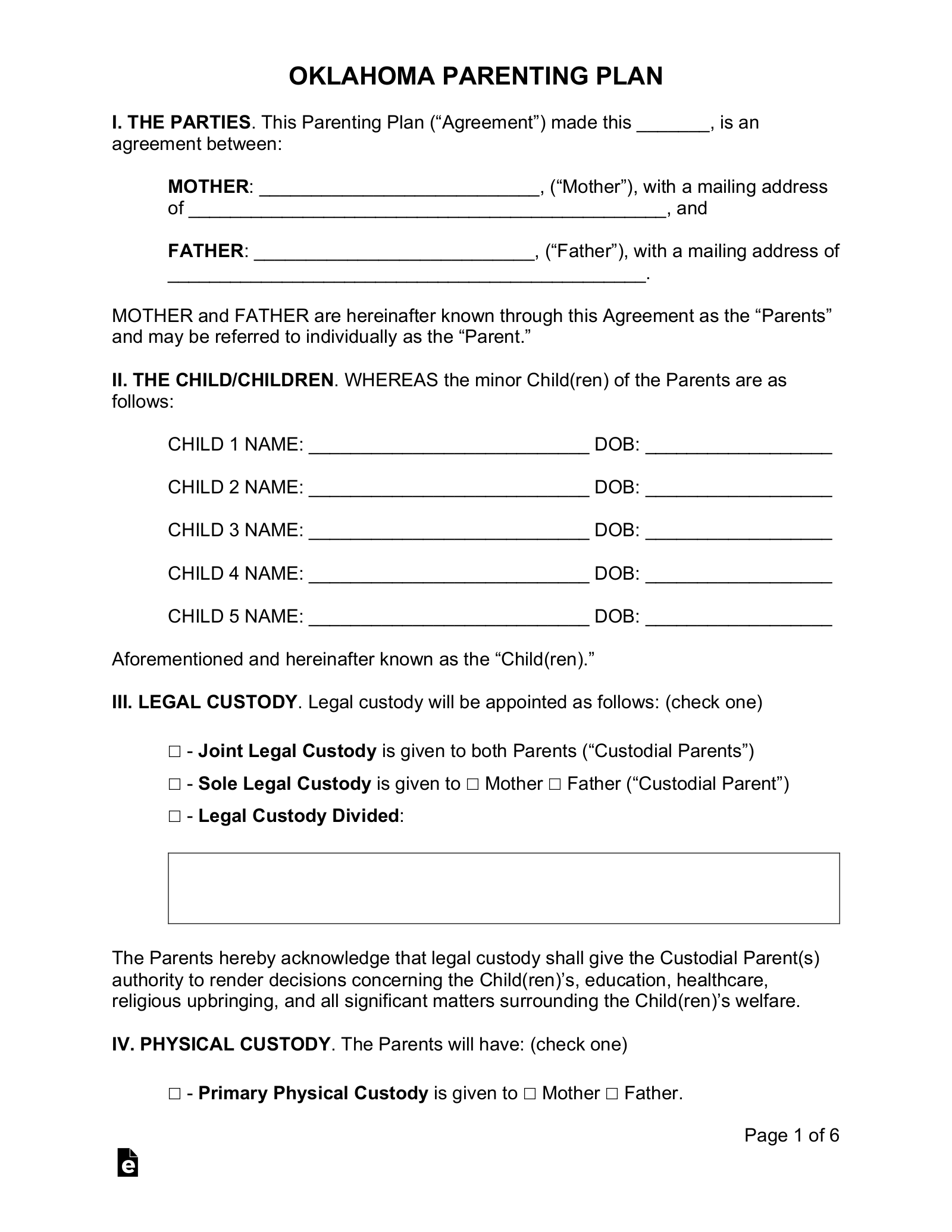Oklahoma Custody Laws for Unmarried Parents
Navigating custody laws can be challenging, especially for unmarried parents in Oklahoma. It’s essential to understand your rights and responsibilities regarding child custody. In Oklahoma, custody laws focus on the child’s best interests, ensuring a stable and supportive environment. This blog post will guide you through the key aspects of custody for unmarried parents, including types of custody, factors influencing decisions, and legal rights. Let’s dive into these important topics to help you better understand your situation.
Understanding Custody Types in Oklahoma

In Oklahoma, there are two main types of custody: legal custody and physical custody. Understanding the differences can help you navigate your custody situation more effectively.
- Legal Custody: This refers to the right to make important decisions about your child’s life, such as education, healthcare, and religious upbringing. Parents can share legal custody or have sole legal custody.
- Physical Custody: This determines where the child will live. Similar to legal custody, physical custody can be joint (shared between parents) or sole (one parent has the child living with them).
It’s also important to note that custody arrangements can change over time. If circumstances change, parents can petition the court to modify custody agreements to better serve the child’s needs.
Factors Influencing Custody Decisions

When determining custody arrangements, Oklahoma courts consider several factors to ensure the child’s best interests are met. Some of these factors include:
- The child’s age: Younger children may need more stability, while older children might express preferences.
- The parents’ living situation: Courts will assess whether each parent can provide a safe and stable environment.
- The child’s relationship with each parent: Strong emotional bonds are taken into account.
- The parents’ ability to co-parent: Courts look for evidence of cooperation and willingness to support the child’s relationship with the other parent.
- Any history of abuse or neglect: This is a critical factor that heavily influences custody decisions.
Each case is unique, and the court evaluates all relevant information to make a fair decision that prioritizes the child’s welfare.
Legal Rights of Unmarried Parents

Unmarried parents in Oklahoma have specific legal rights regarding their children, but these rights may not be as clear-cut as those of married parents. Understanding these rights is crucial for ensuring that you can actively participate in your child’s life.
- Custody Rights: Both parents have the right to seek custody of their child. However, the court will ultimately decide custody based on the child’s best interests.
- Visitation Rights: If one parent has physical custody, the other parent can request visitation rights to ensure they maintain a relationship with the child.
- Child Support: Unmarried parents can seek financial support for the child, regardless of the custody arrangement. The non-custodial parent typically pays child support to help cover the child’s expenses.
- Decision-Making Rights: Parents have the right to make important decisions regarding the child’s education, healthcare, and religious upbringing, especially if they share legal custody.
It’s essential for unmarried parents to understand that while they have rights, they may need to establish paternity to assert those rights fully. Seeking legal guidance can help you navigate these waters effectively.
Establishing Paternity in Oklahoma
Establishing paternity is a crucial step for unmarried parents. It not only defines the legal relationship between a father and child but also secures the father’s rights and responsibilities. In Oklahoma, there are a few ways to establish paternity:
- Voluntary Acknowledgment: If both parents agree on the father’s paternity, they can complete a Voluntary Acknowledgment of Paternity form. This can usually be done at the hospital when the child is born or later through the Oklahoma Department of Human Services.
- Genetic Testing: If paternity is disputed, either parent can request genetic testing through the court. This test compares the child’s DNA to the alleged father’s DNA.
- Court Order: A parent can file a petition in court to establish paternity. The court will then hear the case and make a determination.
Once paternity is established, the father gains legal rights to seek custody or visitation and is also responsible for child support. It’s a vital process that lays the foundation for a father’s involvement in the child’s life.
Filing for Custody in Oklahoma
If you’re an unmarried parent seeking custody of your child, it’s essential to know the steps involved in filing for custody in Oklahoma. Here’s a straightforward guide to help you navigate the process:
- Determine the Appropriate Court: Usually, custody cases are filed in the district court in the county where the child resides.
- Prepare the Necessary Documents: You’ll need to fill out various forms, including a petition for custody. These forms can often be found on the Oklahoma state court website or at your local court.
- File Your Documents: Submit your completed forms to the court clerk’s office. Be prepared to pay a filing fee, which varies by county.
- Serve the Other Parent: After filing, you must legally notify the other parent about the custody request. This can be done through a process server or law enforcement.
- Attend the Hearing: A court hearing will be scheduled where both parents can present their case. Be ready to provide evidence and witness testimony to support your position.
Filing for custody can feel overwhelming, but taking these steps will help you stay organized and focused. Seeking assistance from a family law attorney can also provide clarity and support throughout the process.
Modification of Custody Orders
Custody arrangements are not set in stone. Life changes, and sometimes those changes mean that a custody order needs to be modified. In Oklahoma, either parent can request a modification of custody orders, but certain criteria must be met. Here’s what you should know about the modification process:
- Significant Change in Circumstances: To successfully modify custody, you must demonstrate that a significant change has occurred since the original order. This could include changes in employment, relocation, health issues, or the child’s needs.
- Best Interests of the Child: The court will always prioritize the child’s best interests when considering modifications. Be prepared to present evidence showing how the proposed changes will benefit the child.
- Documentation: Collect any necessary documents that support your request for modification, such as school records, medical reports, or proof of a new job.
- Filing Process: You’ll need to file a petition for modification with the court and serve it to the other parent. This process may also require a hearing where both parents can present their case.
Remember, modifications aren’t guaranteed. The court will carefully review all evidence and arguments before making a decision. Consulting with a family law attorney can help ensure that your case is presented effectively.
Visitation Rights for Unmarried Parents
Visitation rights are an essential aspect of custody arrangements, especially for unmarried parents. These rights ensure that both parents can maintain a relationship with their child, even if they do not have primary custody. Here’s what you need to know:
- Understanding Visitation: Visitation refers to the time a non-custodial parent spends with their child. It can be structured in various ways, including regular scheduled visits or flexible arrangements based on the parents’ circumstances.
- Types of Visitation:
- Supervised Visitation: This may be necessary in cases where there are concerns about the child’s safety. Visits occur in the presence of a third party.
- Unsupervised Visitation: The non-custodial parent has the freedom to spend time with the child without supervision.
- Virtual Visitation: Technology can also play a role, allowing parents to maintain contact through video calls or online platforms.
- Establishing Visitation Rights: If you’re the non-custodial parent, it’s important to formally establish visitation rights through the court to ensure they are legally recognized.
- Modifying Visitation Arrangements: If circumstances change, either parent can request a modification of the visitation schedule by going through the court.
Maintaining a healthy relationship with both parents is crucial for a child’s well-being, and understanding visitation rights is key to achieving that balance.
FAQ about Oklahoma Custody Laws for Unmarried Parents
Here are some frequently asked questions about custody laws in Oklahoma for unmarried parents. These common concerns can help clarify some key points:
- What is the first step to take for custody if I am an unmarried parent?
- The first step is to establish paternity, as this legal recognition is crucial for asserting custody rights.
- Can an unmarried father get joint custody?
- Yes, unmarried fathers can seek joint custody, but they must establish paternity and demonstrate that it is in the child’s best interests.
- What if the other parent doesn’t allow visitation?
- If the other parent is denying court-ordered visitation, you can file a motion with the court to enforce the visitation rights.
- How often can I modify custody arrangements?
- You can request modifications whenever there is a significant change in circumstances, but the court will consider whether the changes are in the child’s best interests.
- Do I need an attorney to file for custody?
- While it’s not required, having an attorney can help you navigate the legal process more effectively and improve your chances of a favorable outcome.
Understanding these FAQs can empower unmarried parents as they navigate custody laws in Oklahoma. If you have more questions, consider consulting a legal professional for tailored advice.
Conclusion on Custody Rights and Responsibilities
Understanding custody rights and responsibilities is vital for unmarried parents navigating the complex family law landscape in Oklahoma. From establishing paternity to filing for custody and determining visitation rights, every step you take is crucial for your child’s well-being. Remember that custody arrangements are designed to serve the child’s best interests, so focusing on what will provide a stable and nurturing environment is key. Whether you are seeking joint custody, establishing visitation schedules, or modifying existing orders, staying informed and proactive will help you advocate effectively for your rights as a parent. Consider consulting with a family law attorney to guide you through the process and ensure that your voice is heard in court. By doing so, you can foster a healthy co-parenting relationship and contribute positively to your child’s life.


